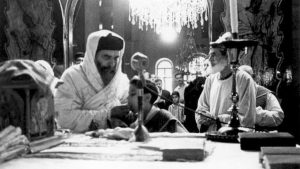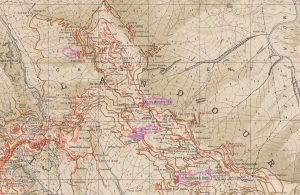
This is a biography, but not as we’ve known them.
While it is about Keller, it is told through the “story of his spiritual and theological influences” (xii). So it felt like being drawn into the footnotes of his life, not just the main text, or even the headlines. It was refreshing. It became this expression of gratitude to those who have gone before, like a theological whakapapa—as we’d say in New Zealand. Then, as the story draws to a close, the author underlines this journey with a lovely image—”we have cut open the tree of (Keller’s) life and ministry to examine the rings” (263-264)—followed by a final assertion:
Future generations will honor Keller better by reading his library than by quoting him (266).
So it is a different kind of biography.
And in engaging with it, I am going to be a bit different as well. As I read, two responses kept repeating themselves. One is how similar some of his foundational experiences are to my own, putting a smile on my face and making his life feel more accessible. The other response is kinda the opposite. ‘Oh, wow, I wish I could do life and ministry all over again’ and make changes in light of Keller’s story. This response flashes for all of us from time to time—but never before in such a sustained way for me. It has been sobering.
The Continuities—with a smile
I knew I was onto something when it was noted how as a child, “When they saw something on TV, Tim wanted to look it up in the encyclopedia” (6). Just like I am with wikipedia today—making watching TV, listening to podcasts and reading books take ever so much longer.
A whole chapter is devoted to The Woman Who Taught Him To Study The Bible (29-40). Barbara Boyd. What is described is almost exactly what happened to me in my first ‘quarter’ of MDiv studies at TEDS, in Charles Sell’s Inductive Bible Study class. Over the years it has evolved into something I call The First XV, sitting at the heart of the way I prepare to preach and train others to do the same. But here, let me pick up the narrative…
Boyd challenged students to observe fifty things from Mark 1.17 in thirty minutes. After ten minutes, most of the students figured they’d found everything they could from the passage … But Boyd wasn’t satisfied. She demanded they dig deeper. After another twenty minutes, the students realised how such intense focus on one short verse could concentrate their powers of observation. When the time concluded, Boyd asked if anyone had discovered their most powerful takeaway during the opening five minutes of the exercise. Keller never forgot the answer. No one raised a hand. After all, no one finds the deepest veins of gold at the mouth of the cave (32-33).
“For Keller this method was an epiphany” (34)—as it was for me. That “powerful takeaway” became for me ‘the ripe observation’. It takes awhile to find, but it often becomes the embryo which grows into the sermon, as well as the spark which fires the sermon!
In 1976, the InterVarsity Student Convention in Urbana impacted Keller so much—just as it did for me three years later, in 1979. Helen Roseveare and John Stott were two influential voices that pop up on both occasions. In fact, there is a lot of John Stott in this story—with his irenic spirit, his model of exposition, his way with dialogue (as contrasted with today’s ‘cancel’ ways), his commitment to the global church, his embrace of word and deed and his articulation of evangelicalism as “the middle space between fundamentalism and liberalism” (39). Ah yes, there have been two generations shaped by all things Stottian—not just two individuals!
At Gordon-Conwell, in Keller’s MDiv days, “Students arrived early to Meredith Kline’s 8.00am classes on the Pentateuch just to hear him open in prayer. Tim Keller took six courses with Kline…” (72). One of the largest pencilled-smiley emojis in the margin of the book lies here because this is just the way I was with Keller’s good buddy, DA Carson, at TEDS—and for similar reasons. Oh, that class on 2 Corinthians. I doubt there was a dry eye in the room when he opened in prayer…
Space for just one more—and with a tear in the eye more than a smile on the face. There are those first experiences of pastoral life—in Hopewell, ‘the chemical capital of the south’ while (for me) at Georgetown in New Zealand’s ‘deep south’, with that fuzzy column of smoke, rising from the Tiwai aluminium smelter, glued to the horizon. The parallels are uncanny. For Keller it was a ‘blue collar’ church community, “with only two members who had graduated from college … (and so the need) to unlearn much of his academic training” (109). Sounds familiar. As I’ve expressed to graduates over the years—’however many years you’ve been in seminary, it’ll take that long to get over seminary in terms of your language’! Hopewell was “his first foray into contextualisation” (109-110) and a little later, describing the move to New York City, the story uses exactly the same phrase I’ve used to describe the challenge in moving from TEDS in the USA to Southland in New Zealand: “contextualisation without compromise” (155).
Hopewell would always evoke affection from the Kellers as they remembered their time there. In Hopewell, Kathy gave birth to all three of their children, all boys. And Tim learned how to be a pastor (110).
I can’t imagine life and leadership without that shortest of seasons as a pastor, and its longest of influences.
One final smile. After that first pastorate, Keller moved to a seminary, eventually filling a gap created by the retirement of one of his key influences—as did I (Ian Kemp). Furthermore the shift was hatched while taking a walk with someone from the seminary at a Bible conference in a holiday destination—as it was for me (Bob Glen at Laidlaw College’s Autumn School in Queenstown in 1989). Funny, eh?!
Okay. I know what you are thinking (so much so, I almost didn’t take this approach). ‘Paul, you are such a child of your generation. You’ve managed to take someone else’s story and make it all about you.’ I see what you mean. Guilty as charged. But stick with me for a bit longer. There is more going on here…
The smiles softened me up for the sighs. While the former were fleeting, the latter linger on…
The Discontinuities—with a sigh
‘Regret’ is probably too strong a word, but it is something of that ilk which I feel.
Reading. Keller didn’t just dabble in those who influenced him, he soaked in them. Whether it be classics, like Richard Baxter and Jonathan Edwards; or, preachers like Ed Clowney and Martyn ‘listened to hundreds of his sermons’ Lloyd-Jones; or, CS Lewis and JR Tolkien—Keller was ‘all in’, as they like to say across the waters.
Fantasy and science fiction of the kind written by Lewis and Tolkien can help meet the heart’s deepest hopes and desires. They reconceive time, reverse death, imagine fellowship with nonhuman beings, defeat evil for good, and celebrate love that will never end. Even when readers know the story isn’t real, they still connect with real emotions (56).
Yikes. My engagement with this Lewis and Tolkien has been pathetic. I suspect the only soaking we’ve shared is ‘in’ John Stott. Last summer I tried to add another one by making my way through Charles Taylor’s 776 page, A Secular Age—and I see that my last pencil-marking is on page 176, exactly 600 pages before the end! However, “Keller read Taylor’s book twice, line by line, over the course of two years” (243). I’m gonna have to try again this summer…
Grace. There is this famous Kellerian line about the progress of the gospel in our lives: “It first says, ‘I am more sinful and flawed than I ever dared to believe’, but then it quickly follows with, ‘I am more accepted and loved than I ever dared hope'”(172). Isn’t that beautiful? The way his understanding of grace dismantles the do-gooder, the self-righteous and the moraliser is something I needed in my life much earlier. I still need it.
If there is no dance, if there is no music, if there is no joy in your life it’s because, either like the prodigal you’re letting your badness get in the way of God, or like the Pharisee you’re letting your goodness get in the way. You’re trying to control him one way or the other. I don’t care how religious your are. If there’s no joy and there’s no dance, you still don’t get it (143).
[from “First Lost Son (and the Kiss of God)”, a Keller sermon]
Christ. In a similar vein, something I needed in my preaching much earlier was his commitment to “preaching grace from every text of Scripture” (166)—and thereby remaining in the text until Jesus is met in the text. This is demonstrated in a compelling way in this series, which appears to be one of his last projects before he died:
For years, including all my time as a pastor, my sermons from the Old Testament were ‘synagogue sermons’, as someone once expressed to me in a letter. I shudder now—and have repented of my ways. Ed Clowney was the big influence on Keller here. I need to go and listen/read his stuff for myself. “Full of biblical and theological details, (Clowney’s lectures) simmered until he approached the fulfillment of Christ, when they began to sizzle in volume and intensity” (134). Here’s to ‘simmer’ and ‘sizzle’…
Listening. Speaking of finding the way to Christ from the Old Testament, I’ve been spending time in the story about Philip and the Ethiopian (Acts 8) in recent days—and am amazed again by the way Philip joined him in his chariot, listening to him and struggling with him (while also honouring the Ethiopian and the seriousness in his intent to find God). Keller joined people in their chariots. It is all through this story. He’d linger with people after church for up to an hour listening to their doubts. ‘Gabfests’ were a big part of his rhythm in ministry. He believed that “the church must become a place where doubters would be welcome, where questions would be honoured, where critics could be answered alongside mature believers” (66). In the shift to New York City, “the city’s diversity and arrogance didn’t intimidate him. He wasn’t scared away by stubborn secularism and spiritual barrenness” (190). He embraced it. “Disagree Without Being Disagreeable” (88-92) is one chapter title, with the culture of the church marked by “irony, charity, humility” (204).
Boy, I’d like to have a go at being more like this. It is a regret, pure and simple. Oftentimes I have been so aware of my lack of intellectual horsepower in engaging questions and doubts that my instinct has been to walk away—rather than walk towards as Keller did, chasing down their chariot, as Philip did. Plus I’ve been slow to imagine or expect that the doubter, or sceptic, may be more like the Ethiopian than I realise. “For churches to grow, Christians need to come out of the closet … rather than shuffle off to church under the cover of Sunday slumber and brunch” (215). Ugh.
This is one area in which Charles Taylor is so helpful. Most people, be they believer or unbeliever, find themselves “either believing in God but doubting from time to time, or doubting God but believing from time to time” (244). Keller “sought to level the playing field between doubters and believers” (244).
Shift. This forced a change in his approach to ‘cultural apologetics’. I took a group of young adults through A Reason for God: belief in age of skepticism soon after it was published in 2008. I thought it was great. But just seven years later Keller realised it was the wrong book with the wrong approach and so he wrote another one—Making Sense of God, in 2015. “It’s the apologetics book he would have written in 2008 if he had known then what he knows now” (242). Such humility. Such wisdom. The world had changed so much and so quickly—and Keller shifted with the changes.
The questions shifted from science and history to morals and values. Doubt and incredulity shifted to anger and denunciation (232).
Can you believe it? That 2008 book addressed seven areas on the minds of sceptics, carefully researched, but sexuality was not one of them. And then, “In less than a decade, the culture of Western education had shifted from tolerance to homosexuality to intolerance of anyone who didn’t affirm homosexuality” (246)—with sexuality becoming “the only objection to Christianity that many sceptics wanted to discuss” (237). However that omission was not the only weakness in the 2008 book—”Even the objections assumed a level of awareness and interest in Christianity that is quickly eroding across the West” (237). Keller realised he needed “to dive deeper into social criticism” (262)—and so that is what he did. And while “chastity wasn’t even comprehensible to most New Yorkers” (203), some of his most memorable—and most downloaded—sermons are on the Christian view of marriage.
I’m grateful for Keller being one of my ‘spiritual and theological influences’ and I shall make a renewed effort to ‘read his library’ rather than just ‘quote him’!
nice chatting
Paul
About Me

the art of unpacking
After a childhood in India, a theological training in the USA and a pastoral ministry in Southland (New Zealand), I spent twenty years in theological education in New Zealand — first at Laidlaw College and then at Carey Baptist College, where I served as principal. In 2009 I began working with Langham Partnership and since 2013 I have been the Programme Director (Langham Preaching). Through it all I've cherished the experience of the 'gracious hand of God upon me' and I've relished the opportunity to 'unpack', or exegete, all that I encounter in my walk through life with Jesus.
Recent Posts
Football helps me train preachers. See, when you speak to me about football—or, ‘footie’—I need to know where your feet are before I can understand what you mean. Are your feet in Ireland, or Brazil, or the USA, or NZ—or in crazy Australia? It must be the most fanatical sporting nation in the world. Within…
Having been born in 1959, I don’t remember much about the 1960s. But I have heard a lot. Hippies. Drugs. Rock ‘n Roll. Assassinations. Moon-walking. A quick trip across to ChatGPT informs me immediately that it was ‘a transformative decade across the world’—marked by the civil rights and feminist movements, Cold War tensions, consumerism and…








Thanks Paul. I loved this book. Tim has been a great encouragement to my ministry over the last decade.
So many riches to explore. I shared an audio with our Development preachers this week of Ed Clowney preaching Christ from the Old Testament and, a bit like your encounter with Carson, its inspiring.
I guess that’s the invitation; to be inspired rather than daunted by these giants of the faith? You help us mere mortals in pulpit do that Paul so thanks so much.
( I think I’m up to page 100 on Taylor 🙂 )
Good to hear from you, Stu. I hope you and Mary are travelling well at this time…
Such good memories of learning together around the ministry of preaching especially.
In the early pages of the book, Clowney’s five lectures on 1 Peter 2 are mentioned. This was the first time Keller heard him speak, I think. I’d love to track down those talks, as 1 Peter 2 only gets bigger and bigger in my developing understanding of church and mission today.
In my younger years I felt a bit captive to the “giants”, as if they were sitting on my shoulder talking into my ear and shaping my thoughts and responses. So your ‘daunted’ word was so true. It was as if the ‘main text’ of my life was just cut-and-pasted from theirs! But the imagery of ‘footnotes’, which struck me as I read this book, has been so helpful. It is what seems to be happening in the book. These ‘giants’, or gurus in India-speak, are still as important as they’ve ever been. But now it is about trying to keep them in the footnotes, multiply their number and look to the Lord, by Word and Spirit, to help the main text be written with greater integrity, and in the company of friends and colleagues.
What say ye?
Paul
Hi Paul,
yes good memories indeed. In fact I reckon you must be due for another trip south to encourage the southern preachers again?!
I haven’t seen the 1st Peter lectures by Clowney but I’ve since dipped into a number of his lectures and sermons and its easy to see why he had such an influence of Tim.
this is a beauty:
https://www.youtube.com/watch?v=JireEO0VK1s
blessings
Stu
Thanks for some more of your very helpful and thoughtful unpacking.
As you know, Tim Keller has been a favourite of mine and Annie’s.
Brother Boz
Thanks, Boz. I hope you can take the time to watch some of the videos in the link in the post. It is fascinating what Keller does and, while it took me awhile to come around, it does seem legitimate. People (like us!) grow up with an atomistic view of the stories of the Bible, kinda independent from each other, but he demonstrates how it holds together as a single story. Over time, this has reinforced by convictions about it being the Word of God. Written over many centuries, with dozens of human authors in diverse settings—and yet a single story…
To listen to some of Ed Clowney’s sermons:
https://www.sermonaudio.com/search.asp?subsetitem=Psalm&subsetcat=bible&keyword=Edmund%5EP%5EClowney&SpeakerOnly=true&includekeywords=&ExactVerse=